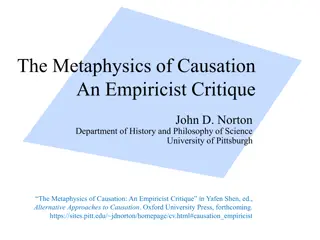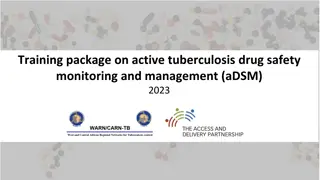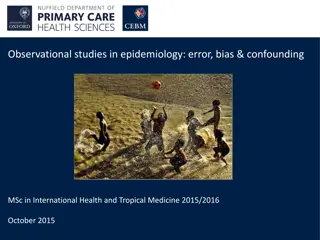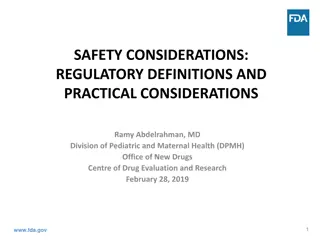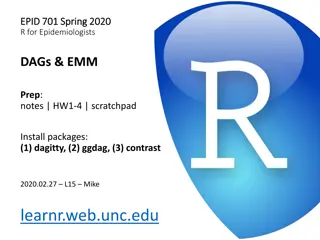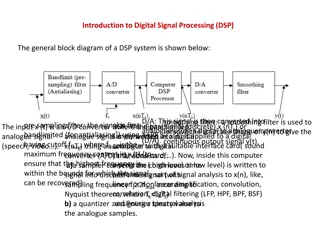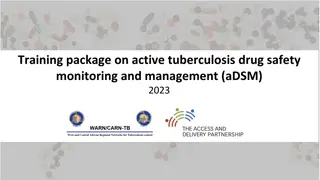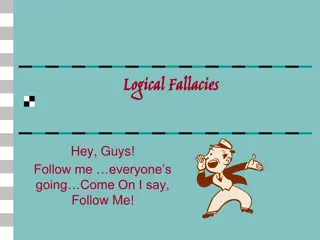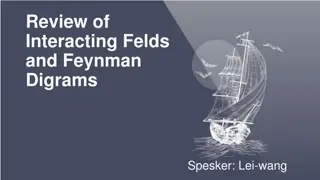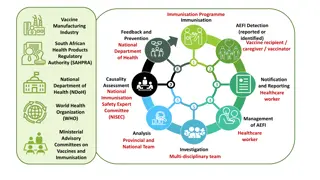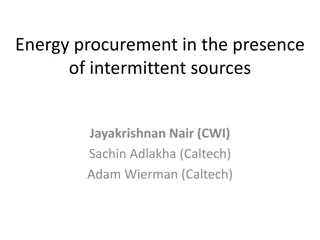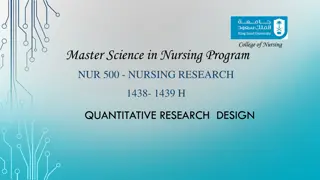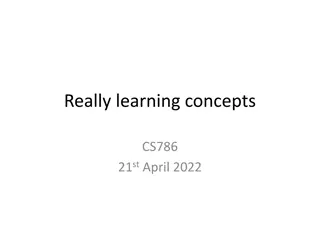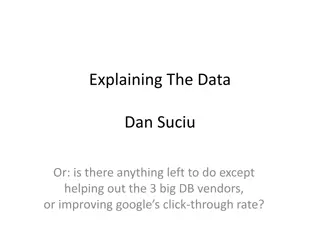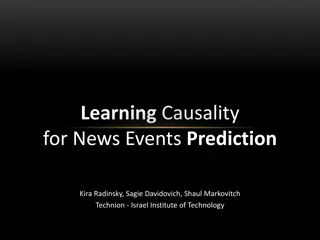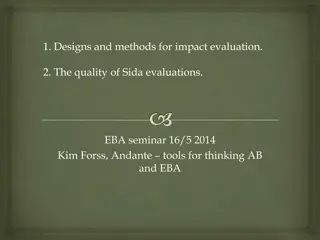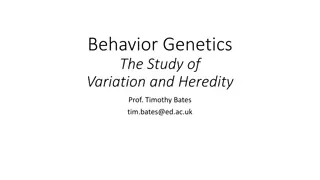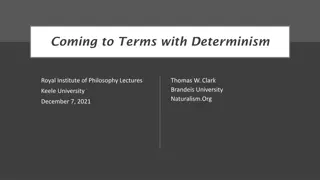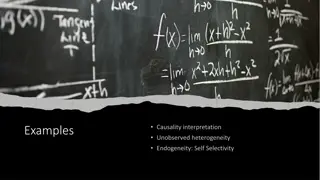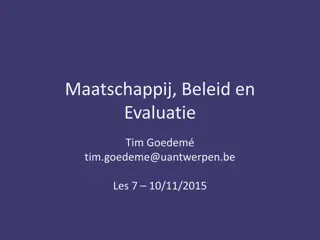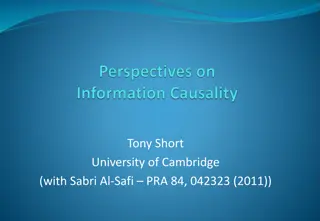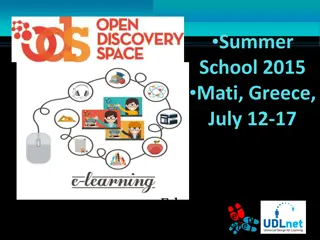Ethical Considerations in AI: Representation, Bias, and Fairness
Exploring the ethical dimensions of artificial intelligence (AI) reveals the unique position AI systems hold in behaving ethically. From causality to interpretability, bias, and privacy concerns, this discussion sheds light on the importance of ethical considerations in AI development and implementa
1 views • 25 slides
Understanding Quantitative Research Designs in Health Research
Quantitative research designs play a crucial role in health research, offering various methodologies like experimental and observational designs. Observational designs are commonly used and can establish associations but not causality. Longitudinal designs track outcomes over time, providing valuabl
3 views • 25 slides
Critique of Causal Metaphysics and Empiricism
In this content, the author critiques the metaphysics of causation from an empiricist perspective, exploring the limitations of empiricism in understanding the contingent truths of the world. It discusses causal antifundamentalism, various forms of skepticism, including Humean skepticism, and challe
4 views • 55 slides
Active Tuberculosis Drug Safety Monitoring and Management Training Package 2023
This training package focuses on the safety monitoring and management of active tuberculosis drugs, specifically emphasizing causality assessment in determining adverse reactions. Participants will learn about assessing the likelihood of TB medicines causing adverse events, attributing relationships
3 views • 17 slides
Understanding Observational Studies in Epidemiology
Delve into the realm of observational studies in epidemiology, exploring concepts such as error, bias, and confounding. Discover the significance of various study designs, from case reports to prospective cohort studies, in elucidating associations and establishing causality in non-communicable dise
0 views • 58 slides
Understanding Association and Causation in Epidemiological Studies
Exploring the concepts of association and causation in epidemiological studies, this content delves into the complexities of determining if exposure leads to disease risk. It discusses different types of associations, such as spurious, indirect, and direct causal associations, illustrating the chall
5 views • 43 slides
Understanding Cross-Sectional Studies: Overview, Strengths, and Weaknesses
Cross-sectional studies are observational study designs that capture data from a population at a specific point in time. This snapshot approach allows for the simultaneous measurement of outcomes and exposures without follow-up. While quick and cost-effective, these studies have limitations such as
1 views • 14 slides
Understanding Chronology in the Victorian Curriculum History
Chronology is essential in historical reasoning, providing structure for organizing historical thought. The Victorian Curriculum History emphasizes the sequencing of events to analyze causality, continuity, and change, enabling students to develop explanatory narratives about the past.
1 views • 35 slides
Safety Considerations and Regulatory Definitions in Drug Evaluation
This presentation by Ramy Abdelrahman, MD, delves into safety considerations, regulatory definitions, and practical responsibilities in drug evaluation. It covers adverse events, suspected adverse reactions, and reporting responsibilities for investigators and sponsors. The content emphasizes making
2 views • 18 slides
Understanding Quantitative Research in Social Studies: A Comprehensive Overview
An in-depth exploration of quantitative research methods in social studies, covering concepts, data analysis, survey techniques, causality identification, and setting up research projects. Emphasizes the importance of grasping strengths, pitfalls, and key points in quantitative research and understa
0 views • 51 slides
Understanding Directed Acyclic Graphs (DAGs) for Causal Inference
Directed Acyclic Graphs (DAGs) play a crucial role in documenting causal assumptions and guiding variable selection in epidemiological models. They inform us about causal relationships between variables and help answer complex questions related to causality. DAGs must meet specific requirements like
1 views • 63 slides
Challenges in Developing Indigenous African Psychology
The lack of development of indigenous African psychology can be attributed to various factors such as the dominance of Western-oriented frameworks in research, Eurocentric nature of mainstream psychology, lack of awareness among African people about psychology, and exclusion of indigenous African kn
2 views • 64 slides
Understanding Digital Signal Processing (DSP) Systems: Linearity, Causality, and Stability
Digital Signal Processing (DSP) involves converting signals between digital and analog forms for processing. The general block diagram of a DSP system includes components like D/A converters, smoothing filters, analog-to-digital converters, and quantizers. DSP systems can be classified based on line
1 views • 12 slides
Scalable Causal Consistency for Wide-Area Storage with COPS
This paper delves into the importance of scalable causal consistency for wide-area storage with the COPS system. It explores desired properties such as availability, low latency, partition tolerance, and scalability within data centers. The document discusses the challenges of achieving consistency
0 views • 41 slides
Building Capacity for Active Tuberculosis Drug Safety Monitoring and Management
This training package focuses on developing capacity for signal detection and causality assessment in the management of active tuberculosis drug safety. Key steps include creating a national coordinating mechanism, defining roles and responsibilities, training staff, and consolidating data electroni
0 views • 12 slides
Vitrage Project Update: Root Cause Analysis Service in OpenStack
Vitrage is an OpenStack service for organizing, analyzing, and expanding alarms and events, providing a holistic view of the system. Founded in Mitaka release, Vitrage became an official project in 2016 with a focus on Root Cause Analysis. It integrates with Mistral for workflow insights and is adva
0 views • 16 slides
Understanding Logical Fallacies and Persuasion Techniques
Learn about logical fallacies, persuasive writing, propaganda, and types of fallacies with examples like circular reasoning and false causality. Recognize how persuasive texts aim to influence readers and the importance of critical thinking when encountering different argumentative strategies.
0 views • 31 slides
Understanding Interacting Fields and Feynman Diagrams in Quantum Field Theory
Delve into the fascinating world of quantum field theory with a focus on interacting fields and Feynman diagrams. Explore perturbation theory, correlation functions, Wick's theorem, and Feynman diagram rules to gain insights into preserving causality, calculating two-point correlation functions, and
0 views • 18 slides
The Intriguing Relationship Between Earth's Rotation, Geomagnetism, and Climate
High correlations between Earth's rotation and climate variables have been observed at multidecadal time scales, sparking questions about a common origin. This study explores the potential causality between geomagnetism, length-of-day variations, and climate, searching for significant correlations a
0 views • 8 slides
Exploring Collateral Laws in SME Finance for Economic Growth
Analyzing the impact of collateral laws on SME finance and sectoral activity, Calomiris et al.'s paper discusses the significance of movable versus immovable collateral and the potential distortions in economic and financial activities. The study evaluates the role of governmental intervention and e
0 views • 10 slides
Understanding Immunisation Programme and AEFI Detection in Vaccine Manufacturing Industry
The content delves into various aspects of immunisation programmes, including AEFI detection, causality assessment, reporting procedures, and implications for COVID-19 vaccination. It explores different categories of reactions following immunisation, such as quality defect-related, product-related,
0 views • 5 slides
Optimizing Energy Procurement in the Presence of Intermittent Sources
Explore strategies for incorporating wind energy into the energy procurement process to minimize costs while meeting demand efficiently. Discusses the impact of long-term wind contracts, uncertainty in wind forecasts, and optimizing procurement strategies subject to causality constraints.
0 views • 26 slides
Understanding Quantitative Research Designs in Nursing
Delve into the world of quantitative research in nursing, exploring different research designs and the concept of causality. Learn about experimental, quasi-experimental, and non-experimental designs, as well as the characteristics of experimental design like manipulation, control, and randomization
0 views • 22 slides
Understanding Conceptualization in Machine Learning
Discussion on two types of representations (Propositional, Non-propositional) and the role of similarity in categorizing stimuli. Exploring supervised and unsupervised categorization methods, along with the capabilities of conceptualization beyond classification and clustering. Comparison of human a
0 views • 21 slides
Challenges in Explaining the Data: A Research Agenda for the Future
Explore the complexities of explaining data, from understanding causality to interactive processes and visualizations. Judea Pearl's work on causality and Halpern's foundational research shape the emerging science of explaining data, highlighting the limitations and challenges faced by data analysts
0 views • 5 slides
Interpreting Evidence on Inhibitor Development in PUPs According to FVIII Concentrate
Alfonso Iorio from McMaster University discusses the methodology for assessing causality, analyzing data on the risk of inhibitors with FVIII concentrate, and the implications for patients. The presentation covers various aspects such as multivariable analysis, brand comparisons, gene mutations, and
0 views • 32 slides
Understanding Causality in News Event Prediction
Learning about the significance of predictions in news events and the process of causality mining for accurate forecasting. The research delves into problem definition, solution representation, algorithms, and evaluation in event prediction. Emphasis is placed on events, time representation, predict
0 views • 36 slides
Analyzing Arguments in English Debates: A Critical Approach
Explore and critique various arguments presented in English debates, including topics like dietary recommendations, digestion issues with Japanese rice, and driving skills in different weather conditions. Learn how to evaluate evidence, causality, and persuasiveness in arguments to develop critical
0 views • 19 slides
Exploring the Philosophy of Time Travel and Possibilities
Delve into a philosophical journey exploring the concept of time travel and various possible worlds. Join Chris as he navigates through different timelines, contemplating the nature of existence and potential realities, challenging notions of identity and choice. The discourse transcends traditional
0 views • 14 slides
Enhancing Impact Evaluation Methods: A Comprehensive Approach
Explores diverse designs and methods for impact evaluations, emphasizing the importance of assessing intervention effectiveness and understanding causal relationships. Discusses specific evaluation tasks and essential questions to determine impact attribution and intervention success, along with cha
0 views • 21 slides
Unraveling the Complexity of Behavior Genetics: Insights and Applications
Delve into the realm of behavior genetics with Prof. Timothy Bates, exploring methodologies like adoption, twin, and family studies. Discover the significance of genetic variance, correlation, and cognitive ability examples. Uncover how genetics untangles causality, why we exhibit variation, and the
0 views • 44 slides
Analysis of Blame and Tragedy in Oedipus the King and Aristotle's Poetics
The question of blame is central in "Oedipus the King," where the city faces a plague and seeks accountability. Aristotelian concepts of tragedy, as outlined in "Poetics," delve into the structure and components of a tragic work, emphasizing plot development and cathartic emotions of pity and fear.
0 views • 28 slides
Understanding Endogeneity and Instrumental Variable Estimation Methods
Endogeneity in econometrics can create challenges such as omitted variables bias, measurement error, simultaneous causality, and using lagged values. This can affect the accuracy of models. One way to address this is through instrumental variable estimation methods. These methods help deal with endo
1 views • 42 slides
Exploring Determinism: Insights on Free Will and Causality
Delve into the philosophical discourse on determinism with a critical examination of free will, agency, and the implications of causality. Discover how leading thinkers challenge the conventional notions of choice and explore the complexities of human behavior in light of scientific revelations.
0 views • 26 slides
Exploring Causal Inference Models and Data-Driven Methods
Delve into various examples of causal inference models and data analysis methods, from traditional statistical models to cutting-edge data-driven approaches like AI/ML. Understand the challenges of causality interpretation and explore the trade-offs between data size, prediction, and causality in di
0 views • 9 slides
Exploring Association Rule Mining in Data Analysis
Association rule mining involves automatically discovering simple if-then rules within a dataset. This process can unveil interesting relationships and patterns, leading to generating hypotheses for further study and finding unexpected connections. While association rules imply causality by their if
0 views • 46 slides
Understanding Causality in Social Policy: A Comprehensive Overview
This content delves into the concept of causality in social policy, focusing on different types of causal relationships and frameworks for causal analysis. It explores the importance of understanding causality for evidence-based policy making and evaluation, touching on key questions and relevant ba
0 views • 55 slides
Exploring Quantum Information Theory and Correlations
Understand the capabilities of quantum theory compared to other potential theories, such as classical and general box-world scenarios. Dive into concepts like the CHSH game, local classical correlations, PR-boxes, and information causality to enhance your grasp on quantum applications and non-local
0 views • 27 slides
Innovative Educational Scenario for Teaching Principles of Dynamics
This educational scenario focuses on the principles of dynamics, emphasizing the causality in physics through inductive teaching methods. Students are engaged in experiments to understand the concept of motion and causality in a multidisciplinary approach involving maths, science, ICT, psychology, a
0 views • 15 slides
Directed Acyclic Graphs (DAGs)
Explore the significance of Directed Acyclic Graphs (DAGs) in comprehending data structures, addressing issues like bias, loss to follow up, and missing data impacts in studies. Gain insights into key concepts, nodes, arrows, causality, associations, causal structures, and the role of confounders. E
0 views • 26 slides


